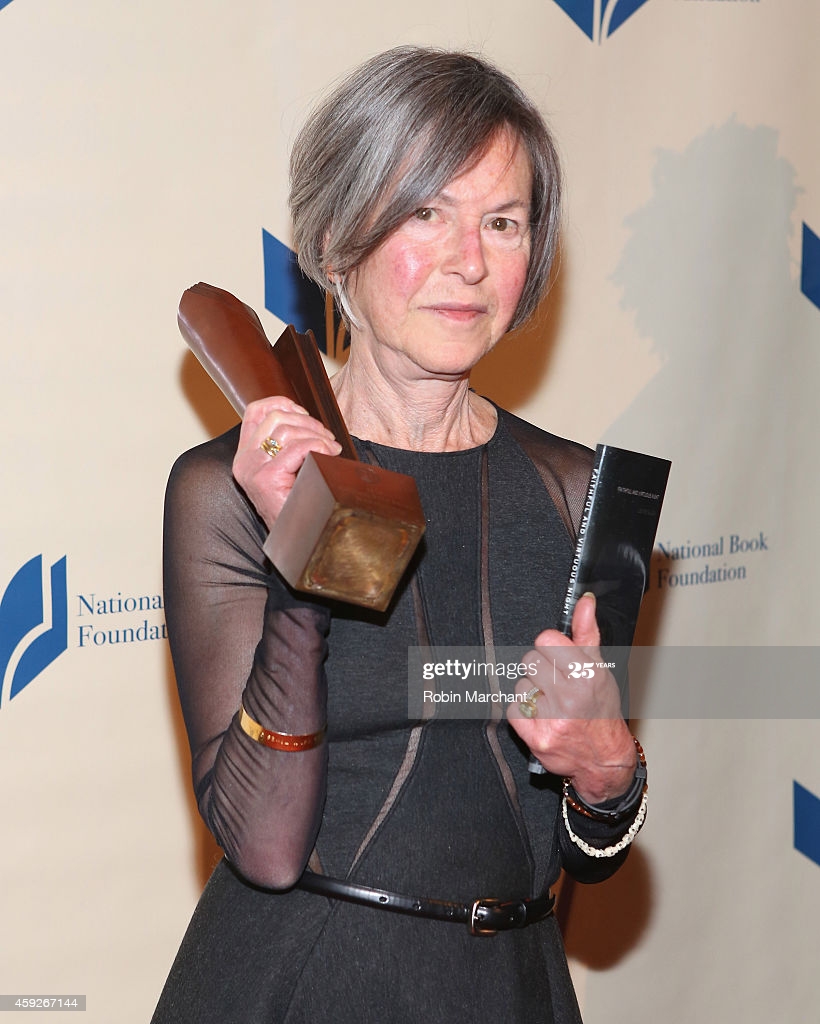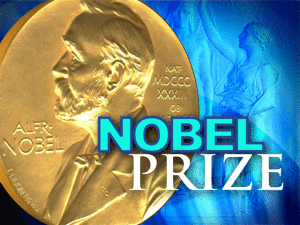Louise Glück Should Refuse the Nobel Prize for Literature. Here’s Why.
NOBEL LAUREATES, 12 Oct 2020
Peter Maass | The Intercept - TRANSCEND Media Service
The Swedish Academy, which selects the Nobel winner, is a corrupt institution that has tolerated genocide denial and sexual assault.

Louise Gluck attends National Book Awards on 19 Nov 2014 in New York City.
Photo by Robin Marchant/Getty Images
7 Oct 2020 – I don’t know what the American poet Louise Glück said when the Swedish Academy informed her that she won this year’s Nobel Prize for Literature, but I know what she should have said: “Thanks, but no thanks.”
October is the season of the Nobel Prizes, when a handful of people are catapulted into fame and fortune due to the philanthropic legacy of the inventor of dynamite. Four of the six prizes named after Alfred Nobel are generally uncontroversial — physics, chemistry, medicine, and economics — but the peace and literature prizes arouse passions. There is good reason to be dubious of the peace prize, which has gone to some great people and organizations but also went to Henry Kissinger and Aung San Suu Kyi. Yet it’s the literature prize that, in its current form, has definitely outlived its usefulness and caused great damage.
Last year, the Nobel Prize for Literature was awarded to Peter Handke, an Austrian writer who created a set of impressive literary works in the first part of his career but since the 1990s fell into a morass of genocide denial. In recent decades, Handke wrote at least a half-dozen books and plays that downplayed and denied the genocide committed by Serbs against Muslims during Bosnia’s war. Handke even attended the funeral, and delivered an eulogy, for the former leader of Serbia, Slobodan Milosevic, who died while on trial for war crimes.
Literary awards have consequences in the real world. The Serb ultra-nationalists whom Handke defends are heroes to violent white extremists throughout Europe and in the United States. By giving a Nobel prize to Handke, the Swedish Academy, which selects the literature winner, essentially ratified a conspiracy theory embedded in his work: that Muslims represent a threat to Christians they live with. Handke’s genocide-denying books, rather than being relegated to the rubbish, were vested with the authority of the Nobel Prize.
The Swedish Academy is a strange organization. It has just 18 members who are appointed for life and who select new members by secret ballot — and the country’s king must approve them. The decision to give the 2019 prize to Handke is not the only evidence of the organization’s unfitness to manage the literature prize. The Academy had to postpone the 2018 award because of revelations that for decades it had abetted sexual harassment and rape by the husband of one of its members. Once that scandal broke open, thanks to the investigative work of journalist Matilda Gustavsson of Dagens Nyheter, the dismal response of the male-dominated Academy included forcing out a female member, Sara Danius, who was pushing for sweeping reforms in its ranks.
In a way, we can be thankful for these scandals because they are reminders of the need to implement a root-and-branch reform of the Nobel literature prize. For much of its existence, the prize generally served as a referendum on the best in Western literature. For that task, the 18 members of the Swedish Academy were a serviceable jury. But more than ever, the reach and aspiration of the Nobel literature prize is truly global. It is laughable and tragic that an award of such influence should be controlled by a tiny and secretive group of Swedes, let alone ones who have shown themselves to be abettors of sexual assault and genocide denial.
The Nobel Foundation, which oversees all the Nobel Prizes, would do the world a huge favor by firing the Swedish Academy. I don’t have a precise proposal for a replacement, but it would seem wise for a world literature prize to be decided by a diverse jury for whom non-European languages — such as Chinese, Hindi, Arabic, and Urdu — are first or second languages. And it would be wise to not have these jurors appointed for life, because unassailable privilege is an inherent force of rot.
It was expected that the Swedish Academy would announce a “safe” choice today who would not invite criticism — that is to say, an individual who unlike Handke does not support genocide and is not European and is not male. Glück, a celebrated and uncontroversial poet who lives in Massachusetts, checks every box. The Academy, in this scenario, hopes it will have ridden out its scandals and shown that it can do the job. But let’s not be fooled. The Swedish Academy is fatally flawed. It will do wrong again because it cannot surmount its inherent limitations
It’s the moment to challenge corrupt institutions rather than thank them.
The Nobel Foundation has not shown a willingness to do what it should. That’s why Glück should refuse the award — to force a desperately needed change that would benefit the world’s readers and writers. Glück would become materially poorer by passing up the $1 million prize money, but she would probably become more famous and, who knows, that could lead to more book sales. Writers are supposed to be forces of conscience, so standing up to the Swedish Academy would be fitting. It has happened before: In 1964, Jean-Paul Sartre refused to accept his literature Nobel.
That’s a lot to ask for, of course. There is a halfway point — accept the award but ceaselessly call out the Swedish Academy, which has little backbone. Bob Dylan, the literature laureate in 2016, didn’t even issue a statement of thanks and sent Patti Smith to the award ceremony, and he still got the check. The year is 2020, a time of emergency. It’s the moment to challenge corrupt institutions rather than thank them.
Update: Oct. 8, 2020
This story has been updated to note that Louise Glück was announced as the winner of the 2020 Nobel Prize for Literature.
Correction: Oct. 7, 2020
An inaccurate reference to the Nobel Foundation being based in Oslo has been removed.
_____________________________________
Tags: Literature, Nobel Literature Prize, Poetry
DISCLAIMER: The statements, views and opinions expressed in pieces republished here are solely those of the authors and do not necessarily represent those of TMS. In accordance with title 17 U.S.C. section 107, this material is distributed without profit to those who have expressed a prior interest in receiving the included information for research and educational purposes. TMS has no affiliation whatsoever with the originator of this article nor is TMS endorsed or sponsored by the originator. “GO TO ORIGINAL” links are provided as a convenience to our readers and allow for verification of authenticity. However, as originating pages are often updated by their originating host sites, the versions posted may not match the versions our readers view when clicking the “GO TO ORIGINAL” links. This site contains copyrighted material the use of which has not always been specifically authorized by the copyright owner. We are making such material available in our efforts to advance understanding of environmental, political, human rights, economic, democracy, scientific, and social justice issues, etc. We believe this constitutes a ‘fair use’ of any such copyrighted material as provided for in section 107 of the US Copyright Law. In accordance with Title 17 U.S.C. Section 107, the material on this site is distributed without profit to those who have expressed a prior interest in receiving the included information for research and educational purposes. For more information go to: http://www.law.cornell.edu/uscode/17/107.shtml. If you wish to use copyrighted material from this site for purposes of your own that go beyond ‘fair use’, you must obtain permission from the copyright owner.

This is a very strange article! It’s sweeping conclusions include:
1. “The Swedish Academy is a strange organization.”
2. “Glück should refuse the award — to force a desperately needed change that would benefit the world’s readers and writers. Glück would become materially poorer by passing up the $1.1 million prize money, but she would probably become more famous…”
3. “There is a halfway point — accept the award but ceaselessly call out the Swedish Academy, which has little backbone. Bob Dylan, the literature laureate in 2016, didn’t even issue a statement of thanks and sent Patti Smith to the award ceremony, and he still got the check.”
Mr. Maas bases his conclusions on this sketchy bit of info: “Last year, the Nobel Prize for Literature was awarded to Peter Handke, an Austrian writer who created a set of impressive literary works in the first part of his career but since the 1990s fell into a morass of genocide denial.”
It is strange that a cri de Coeur against the “abuses” of a Prize for Literature offers readers not one single quotation from any of the writers mentioned in this diatribe. Not a single offensive quote from Peter Handke–one that would actually illustrate his “morass of genocide denial”; not one poorly-written line or ill-chosen metaphor or simile from this year’s poetry-champion, Ms. Gluck; not even a memorable phrase from Bob Dylan to justify this billionaire’s–?… multi-millionaire’s?–taking the money without so much as a whispered “thanks,” while indubitably poorer Ms. Gluck should proudly slink away with naught.
(Why such a mysterious hide-and-seek composition, Mr. Maas? Could one say, “The answer is blowing in the wind”?)
Frankly, there is far too much “journalism” of this type these days! The reporter/journalist/commentator reaches his/her conclusions, passionately presents his/her point of view, but seems to lack the ability to let the “facts” speak for themselves; i.e., to present a convincing case, based on actual statements that can be supported or refuted; based on trusting an informed reader to make his/her own decisions about the veracity and power of the arguments presented.